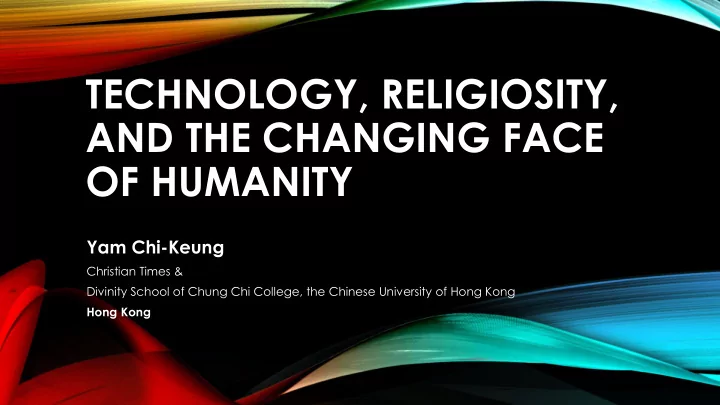

TECHNOLOGY, RELIGIOSITY, AND THE CHANGING FACE OF HUMANITY Yam Chi-Keung Christian Times & Divinity School of Chung Chi College, the Chinese University of Hong Kong Hong Kong
TECHNOLOGY | HUMANITY Human-technology relationship is (almost) as old as the human species • There is not one single point in history at which humans were free from technology • As a species, humans had never lived a tech-free life • ‘Technology’ as part of the human imprint • To be human is to be technê
TECHNOLOGY | HUMANITY 【 excursion 】 THE CLASSICAL UNDERSTANDING • the capacity to utilise tools (technology) as a distinctive mark /defining trait of ‘being human’ IS NO LONGER VALID • Challenged fundamentally by numerous findings from ethological researches over the past 2 decades or so • Many other species exhibit sophisticated capacities of using tools YET: technology has been an integral part of human life ever since the beginning of history
TECHNOLOGY | HUMANITY • Technology as mediator (medium) between humans and the rest of the world • Humans use technology as the means (medium) to: • Comprehend (figure out about) • Communicate with • Shape • Manipulate the world around them • Marshall McLuhan: media as extensions of humans • Media broadly understood
TECHNOLOGY | HUMANITY While HUMANS USE TECHNOLOGIES to serve their own purposes, They are also SHAPED BY TECHNOLOGIES in their …… • Understanding of the world • Expression of selves • Interaction with their surroundings Often shifting the course of civilization … religion included
CHRISTIANITY | TECHNOLOGY Religion – in particular Christianity – has had an intensely ambivalent LOVE-HATE relationship with technology
CHRISTIANITY | TECHNOLOGY Church / religious authorities often betray • FEAR • SUSPICION • AVOIDANCE • SKEPTICISM of technology While at the same time have often • USED • EMBRACED • APPROPRIATED technology to their own benefit
CHRISTIANITY | TECHNOLOGY Christianity as BENEFICIARY of technology: • Writing technology formation of written Scriptures ~ c. 2 nd century BC – 2 nd century AD end of oral tradition, closing of the Bibical canon • Printing technology availability & popularization of the Bible ~ 15 th century…… The Protestant Reformation ~ 16 th century……
CHRISTIANITY | TECHNOLOGY Christianity as BENEFICIARY of technology: • Voyaging technology missionary enterprise ~ 16 th century…… • Mass communication technology ~ 20 th century evangelism through the media – radio, film, TV, music discs, … etc.
CHRISTIANITY | TECHNOLOGY From its very beginning, Christianity has always been a technologized religion . Without (media) technology, it would not have existed … … in the way we know it today.
CHRISTIANITY | TECHNOLOGY Yet churches (as institutions) and Christians (as individuals) are seldom conscious of the implications of the technologies employed.
TECHNOLOGY IN CHURCH The WhatsApp deacons meeting. The smart phone app Scripture reading. The PowerPoint hymn singing. The PowerPoint sermon. The downloadable church bulletin. The QR Code attendance record. The cyber / online church. The Alexa prayer. Common sight. No big deal. Right?
TECHNOLOGY IN CHURCH Technology use in the church mirrors technology use in daily lives in the society’s mainstream. Nothing particularly religious.
TECHNOLOGY IN CHURCH Churches / Christians are usually oblivious to the RELIGIOUS, THEOLOGICAL, EXISTENTIAL implications of their technology use. They may not even realise that there ARE such implications. What will change (are changing) when church life (and daily life) becomes more & more DETACHED FROM THE MATERIAL?
TECHNOLOGY IN CHURCH 【 transitions 】 • Oral tradition written text (shortly after Jesus) • Scribal copying printing (post-Guttenberg) ~ mass availability of the Bible Shift in religious sensibility: • Ways of transmitting / receiving religious information • Perceptions & udne & understanding of the Divine • Essential nature of faith
TECHNOLOGY IN CHURCH Late modern digital-virtual technologies: Pushing humans away from materiality ~ the paper, the person, the body, the touch, the smell…… A sense of REVERSE / COUNTER INCARNATION?
A FEW STEPS FURTHER 【 wild imagination of the SF freak? 】 The human species (and thus humanity) could be ‘evolving’ beyond (read: moving away from) the state with which we are familiar…… • Virtual technology partial immaterial existence • Genetic engineering enhanced material body • Cyborg (cybernetic-organism) technology blurred human-machine differentiation • Artificial intelligence enhanced mental capacity
A FEW STEPS FURTHER 【 NOT the wild imagination of SF freak 】 Virtual technology. Genetic engineering Cyborg. Artificial intelligence These are realities NOW. Things that can reformulate humanity is happening NOW.
POSTHUMAN SPIRITUALITY Changes occurring…… • Human modes of communication & relationship to one another • Human self-understanding (as a species) • Human perception of own position within the world / universe Altered / altering mode of human existence Altering human understanding & imagination of the Divine
POSTHUMAN SPIRITUALITY Much have been said about the worship of technology (such as AI) as religion / idolatry, but …… What if the android (human- like robot) who works for you …… • asks to go to church with you? • asks to learn about the Christian faith? • asks to become a Christian, to be baptized……? • wants to go to seminary? • preach and pray on the pulpit? What if your highly intelligent android phone asks for the same???
POSTHUMAN SPIRITUALITY CAN THAT HAPPEN? DO YOU ALLOW THAT TO HAPPEN? WOULD YOU ACCEPT HER/HIM (IT?) AS A SISTER IN CHRIST? Your answer to such questions is of course a product of your view of technology and of the future of humanity.
Recommend
More recommend